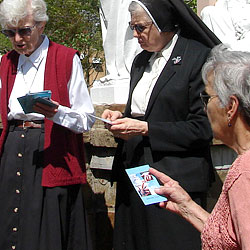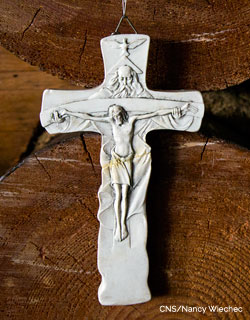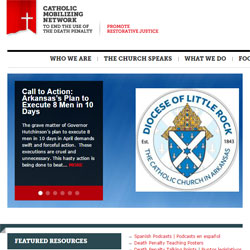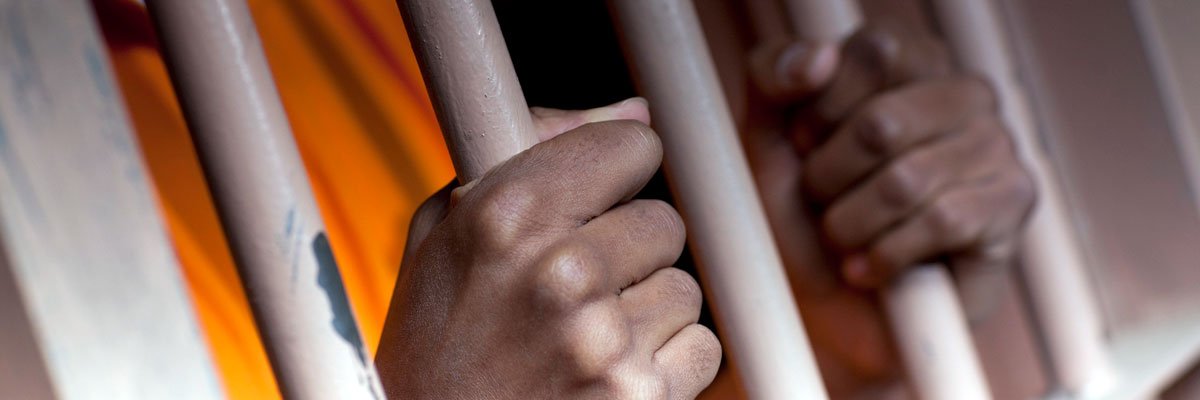Official Website of the
Catholic Diocese of Little Rock
What's New
Bishop addresses death penalty bill - Feb 25, 2025 Bishop Anthony B. Taylor issued the following letter to Catholics in Arkansas,... |
Catholic Teaching on Death Penalty
"Assuming that the guilty party's identity and responsibility have been fully determined, the traditional teaching of the Church does not exclude recourse to the death penalty, if this is the only possible way of effectively defending human lives against the unjust aggressor. If, however, non-lethal means are sufficient to defend and protect people's safety from the aggressor, authority will limit itself to such means, as these are more in keeping with the concrete conditions of the common good and more in conformity to the dignity of the human person. Today, in fact, as a consequence of the possibilities which the state has for effectively preventing crime, by rendering one who has committed an offense incapable of doing harm — without definitely taking away from him the possibility of redeeming himself — the cases in which the execution of the offender is an absolute necessity 'are very rare, if not practically nonexistent.'" — Catechism of the Catholic Church, no. 2267
USCCB and Vatican Statements
Key Quotes
The following quotes were taken from: A Culture of Life and the Penalty of Death: A Statement of the U.S. Conference of Catholic Bishops Calling for an End to the Use of the Death Penalty.
"For many left behind, a death sentence offers the illusion of closure and vindication. No act, even an execution, can bring back a loved one or heal terrible wounds. The pain and loss of one death cannot be wiped away by another death."
"When Cain killed Abel, God did not end Cain's life. Instead, he sent Cain into exile, not only sparing his life but protecting it by putting a mark on Cain, lest anyone should kill him at sight." (Genesis 4:15).
"Each of us is called to respect the life and dignity of every human being. Even when people deny the dignity of others, we must still recognize that their dignity is a gift from God and is not something that is earned or lost through their behavior. Respect for life applies to all, even the perpetrators of terrible acts. Punishment should be consistent with the demands of justice and with respect for human life and dignity."
"We also share the hurt and horror, the loss and heartache that are the result of unspeakable acts of violence. We have presided at the funerals of police officers killed in the line of duty and have consoled parents who have lost children. We have heard the anger and despair of victims families who feel ignored by the criminal justice system, society as a whole, and, at times, even the Church. Our family of faith must care for sisters and brothers who have been wounded by violence and support them in their loss and search for justice. They deserve our compassion, solidarity, and support spiritual, pastoral, and personal. However, standing with families of victims does not compel us to support the use of the death penalty."
“Let’s say ‘yes’ to life and ‘no’ to death.” (Pope Francis, Jan 19, 2014) Catholics believe in the sanctity of life from conception to natural death. Originally scheduled to start on Easter Monday, the state of Arkansas planned to execute eight men on death row from April 17-27. Ledell Lee was executed April 20, and Jack Jones and Marcel Williams were executed April 24. Kenneth Williams is scheduled to be executed April 27. Read Arkansas Catholic to learn more. All Catholics are asked to join Bishop Anthony B. Taylor in taking the steps below. To stay up to date on the latest efforts to stop these executions, follow Arkansas Catholic on Facebook.
E-mail Gov. Asa Hutchinson Now
E-mail Gov. Asa Hutchinson asking him to commute the sentences of these men to life without parole: Don Davis, Bruce Earl Ward, Stacey Johnson, Jason McGehee and Kenneth Williams. Looking for suggestions on what to write? See your parish bulletin insert, these Suggested Bullet Points from the Catholic Mobilizing Network, or read Bishop Taylor's Letter to Governor.
Attend a vigil to stop the executions

The Arkansas Coalition to Abolish the Death Penalty is hosting events to stop the executions through April 27. To find the latest information about these events, visit the organization's Facebook page or follow them on Twitter.
This organization hosted the Arkansas Rally Against Historic Mass Executions on Good Friday, April 14, on the Arkansas State Capitol steps in Little Rock. Bishop Taylor spoke at the event, where, as a religious leader, he shared a religious perspective of the death penalty based on Good Friday. Read his remarks.
The Arkansas Coalition to Abolish the Death Penalty is a nonpartisan, ecumenical organization that brings together social justice and religious organizations in Arkansas to oppose the death penalty. For more information, e-mail info@arkansasabolish.com or call (929) 341-0041.
The Benedictine sisters of St. Scholastica Monastery in Fort Smith (above, right) prayed a Novena for Clemency April 9-17 for the men to be executed. Visitors joined them in praying in the monastery cemetery each day at 3 p.m.
Pray for victims' families, those to be executed
 Pray for the victims of the crimes committed by these men and for the healing of their family and friends. We cannot know fully the pain their loved ones will feel the rest of their lives. May they experience the overwhelming mercy of our God.
Pray for the victims of the crimes committed by these men and for the healing of their family and friends. We cannot know fully the pain their loved ones will feel the rest of their lives. May they experience the overwhelming mercy of our God.
Pray for those scheduled to be executed, their families and our governor. Pray for an end to the death penalty that diminishes all of us and is not needed to protect society in our country.
Consider the following options to pray individually, with family, friends, at prayer group or your parish.
Intercessory Prayers and Prayer To End The Use Of The Death Penalty — from the U.S. Conference of Catholic Bishops
Sister Helen Prejean’s Prayer to End the Death Penalty — author of "Dead Man Walking: An Eyewitness Account of the Death Penalty"
Additional resources to consider
— To stay up to date on the effort to stop these executions, follow Arkansas Catholic on Facebook or the Arkansas Coalition to Abolish the Death Penalty on Facebook and Twitter.
 — The Death Penalty and the Church is the bulletin insert sent to all Catholic parishes in Arkansas. If you didn't see it at Mass, download and share it here. It is available in English and Spanish.
— The Death Penalty and the Church is the bulletin insert sent to all Catholic parishes in Arkansas. If you didn't see it at Mass, download and share it here. It is available in English and Spanish.
— In addition to its appeal to stop the executions in Arkansas, the Catholic Mobilizing Network, an ministry of the USCCB, profiles the men to be executed and offers the history of the death penalty in Arkansas. Also available is the Arkansas Fact Sheet.
— Sister Helen Prejean, CSJ, sent video messages to Gov. Hutchinson appealing to him to stop the executions in Arkansas. Watch them on her Facebook page.
— The Death Penalty Information Center just updated its nationwide Facts About Death Penalty sheet on March 20, 2017. It details executions by race, state, death row exonerations, if executions are a deterrence and more.
What's New
Bishop addresses death penalty bill - Feb 25, 2025 Bishop Anthony B. Taylor issued the following letter to Catholics in Arkansas,... |
Catholic Teaching on Death Penalty
"Assuming that the guilty party's identity and responsibility have been fully determined, the traditional teaching of the Church does not exclude recourse to the death penalty, if this is the only possible way of effectively defending human lives against the unjust aggressor. If, however, non-lethal means are sufficient to defend and protect people's safety from the aggressor, authority will limit itself to such means, as these are more in keeping with the concrete conditions of the common good and more in conformity to the dignity of the human person. Today, in fact, as a consequence of the possibilities which the state has for effectively preventing crime, by rendering one who has committed an offense incapable of doing harm — without definitely taking away from him the possibility of redeeming himself — the cases in which the execution of the offender is an absolute necessity 'are very rare, if not practically nonexistent.'" — Catechism of the Catholic Church, no. 2267
USCCB and Vatican Statements
Key Quotes
The following quotes were taken from: A Culture of Life and the Penalty of Death: A Statement of the U.S. Conference of Catholic Bishops Calling for an End to the Use of the Death Penalty.
"For many left behind, a death sentence offers the illusion of closure and vindication. No act, even an execution, can bring back a loved one or heal terrible wounds. The pain and loss of one death cannot be wiped away by another death."
"When Cain killed Abel, God did not end Cain's life. Instead, he sent Cain into exile, not only sparing his life but protecting it by putting a mark on Cain, lest anyone should kill him at sight." (Genesis 4:15).
"Each of us is called to respect the life and dignity of every human being. Even when people deny the dignity of others, we must still recognize that their dignity is a gift from God and is not something that is earned or lost through their behavior. Respect for life applies to all, even the perpetrators of terrible acts. Punishment should be consistent with the demands of justice and with respect for human life and dignity."
"We also share the hurt and horror, the loss and heartache that are the result of unspeakable acts of violence. We have presided at the funerals of police officers killed in the line of duty and have consoled parents who have lost children. We have heard the anger and despair of victims families who feel ignored by the criminal justice system, society as a whole, and, at times, even the Church. Our family of faith must care for sisters and brothers who have been wounded by violence and support them in their loss and search for justice. They deserve our compassion, solidarity, and support spiritual, pastoral, and personal. However, standing with families of victims does not compel us to support the use of the death penalty."





